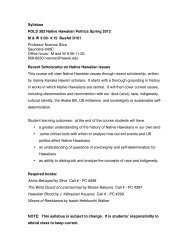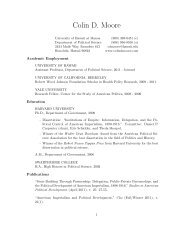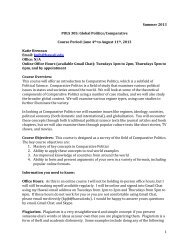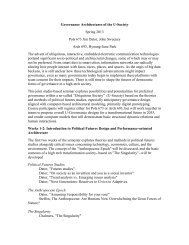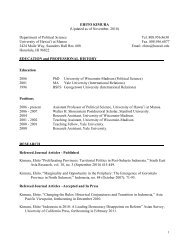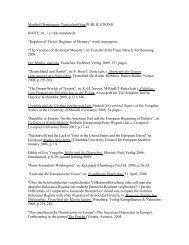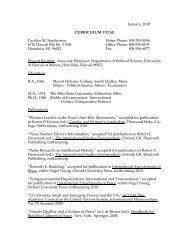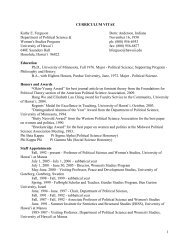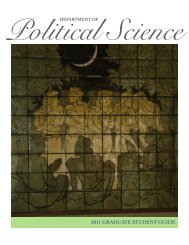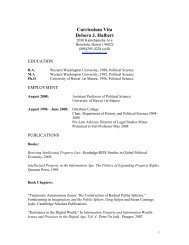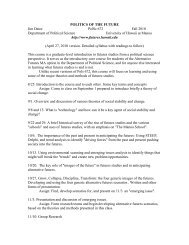syllabus - Department of Political Science
syllabus - Department of Political Science
syllabus - Department of Political Science
You also want an ePaper? Increase the reach of your titles
YUMPU automatically turns print PDFs into web optimized ePapers that Google loves.
Learning Objectives<br />
• Students will understand the diversity <strong>of</strong> indigenous peoples and struggles, and think critically about indigeneity as an identity<br />
<strong>of</strong> alliance; by calling ourselves ‘indigenous,’ we connect to others beyond our local struggles.<br />
• Students will strengthen your comprehension <strong>of</strong> important terms and concepts in <strong>Political</strong> <strong>Science</strong> and Indigenous Politics:<br />
indigeneity, liberalism, colonialism, settler-colonialism, decolonization, sovereignty, self-determination, survivance,<br />
neoliberalism, reconciliation/recognition, genocide, Wasáse, etc.<br />
• Students will put theory into practice through community engaged research and service.<br />
• Students will analyze intersecting axes <strong>of</strong> oppression and privilege, particularly indigeneity, race, gender, sexuality, and class.<br />
Assessments and Grading<br />
20% Participation and Attendance<br />
This course is discussion based; regular attendance and participation are critical to its success and yours. In order to actively<br />
participate in class discussion, complete in-class activities (small group work, quizzes, writing, etc.) and make the most <strong>of</strong> your<br />
learning experience, you must do all the readings and come to class prepared to discuss them. The written and oral exercises in class<br />
are designed to help you process the readings, as well as to demonstrate that you have read prior to arriving at class. These exercises<br />
may include written summaries, impromptu debates, guided discussion, role-plays, and other formats. Activities will generally be<br />
done at the beginning <strong>of</strong> the class. Sometimes there will be group activities. You need to be in class in order to earn the points. Both<br />
written and oral exercises will be graded on the following scale:<br />
3 – Shows you understood the reading and put in strong effort. For group work, each member actively contributed to the group<br />
and worked to be inclusive and collaborative <strong>of</strong> all group members.<br />
2 – Shows only partial understanding <strong>of</strong> the reading and put in moderate effort. For group work, draws only on contributions from<br />
some group members.<br />
1 – Made an attempt but showed little if any understanding <strong>of</strong> the reading. Group work relies only on one individual.<br />
0 – No attempt.<br />
15% Key Concept Presentation<br />
This assignment is aimed at strengthening your understanding <strong>of</strong> core concepts through a collaborative learning process. With a small<br />
group <strong>of</strong> your classmates, you will give the class a 10-minute presentation on a designated concept. The presentation or activity can<br />
take any form you choose: skit, panel discussion, musical interpretation, video, etc. It must be aimed at helping the audience better<br />
understand the concept, in the context <strong>of</strong> Indigenous politics. One example for inspiration is The Pinky Show’s video archive. For<br />
example, check out their piece on “Kaho‘olawe,” URL: http://www.pinkyshow.org/videos/thirteen-things-i-learned-at-kahoolawe<br />
2



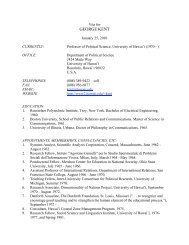
![Fall 2012 POLS 620 Syllabus [PDF] - Department of Political Science](https://img.yumpu.com/25416938/1/190x245/fall-2012-pols-620-syllabus-pdf-department-of-political-science.jpg?quality=85)
